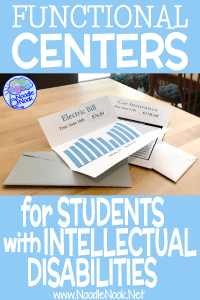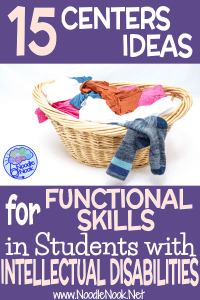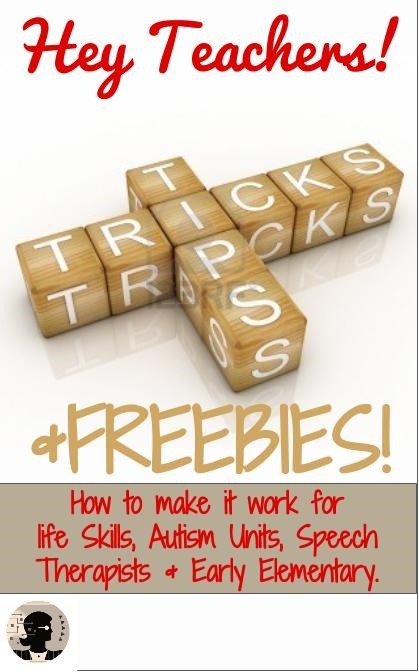On the Noodle Nook Podcast today, we talk about functional centers for students with Autism and Intellectual Disabilities. Emily asks:
How and what functional skills should I teach to my self-contained high school class of 20 students with intellectual disabilities?
Centers for Functional Skills in High School
Wow Emily! That is a lot of students in a self-contained classroom. Just managing that can be tough and meeting the needs of so many students will be a challenge. Good news is that you CAN do it and do it with purpose!
Most states have or are changing the law to require all students who graduate from k-12 to have curriculum that is based on the state standards. Even with academic curriculum in your classroom, you may have enough time to work on other skills. So, with that in mind, it sounds like you are interested in some other ideas for functional skills you can work on beyond that. So let’s talk about that a bit…
Functional Centers for Autism Units
The activities you choose will depend largely on the transition plan in place for your students and what their true needs are for the independent living, job, or school after they graduate. Some students in your classroom will likely not live independently and need support by living at home, with family, in a group home, or in an assisted living facility. Additionally, some students will work paid jobs, others will have volunteer jobs, and still others will participate in a day hab program. Knowing what your student’s life will be like after high school can help you as your craft your functional activities.
As a guide, think of some categories of functional skills.
- Health/Hygiene
- Social Skills
- Financial skills
- Food Skills
- Household Skills
- Safety Skills
- Sleeping Skills
- And Self- Advocacy skills.
Okay… so let’s talk about each of those in terms of activities or centers you could set up in your classroom.
Centers for Health and Hygiene
- I absolutely love grooming checklist, so think of a way to incorporate students learning how to check over themselves and see how they look.
- You can also include centers where the soul activity is tooth brushing or hand washing.
Centers for Social Skills
- For students who are on a more basic level, working on social skills can be as easy as identifying facial expressions and body language. Putting together a center based on that will help with student navigate through nonverbal communication.
- Another idea for social skills is to set up a what would you do Center where students have to answer social skills situations. Providing a graphic organizer, allowing students to record a video response, or having students role-play with a peer is a great way to practice in the center like this.
Centers for Financial Skills
- Everybody has to know how to pay the bills! A great activity in the center would be to receive a paycheck and then have to pay out several bills. You may intentionally have less money than bills do so that a student has to determine how to prioritize. You can use checking account registers, cash, or have students write out physical checks. Either way, it’s a great center to build some some budgeting skills and personal finance wherewithal.
- I also suggest a center where students comparison shop. You can do that with to store flyers that probably get delivered to your house every week. On a Post-It write an item, like cereal, and then have students look through the Flyers to find the cheapest option. What a great way to price shop and work on math skills at the same time!
Centers for Food Skills
- Everyone needs to know some very basic cooking skills in order to live independently. Try throwing in some centers where students have to make a snack, a cold lunch that they might take to work, or even a breakfast that goes beyond a bowl of cereal. You may be able to get away with a lot of cooking activities that don’t require a stove, oven, or even a microwave. Even without those items there still some skills that you can develop that will support your students.
- As a second option, have students practice making food choices at fast food joints, sit down restaurants, and even in the school cafeteria. They should be looking for things like calories, fat content, grams of sugar, and overall estimated nutrition. Sometimes our students can really pack on the pounds when they transition to Independent Living because they don’t have a good foundation of how to make food choices when they’re out to eat or even purchasing groceries.
Centers for Household Skills
- Household skills can take on a lot of different tasks, and I have found that I can usually address these with some chores inside of my classroom. I’ve always had a chore chart that the students did as part of their classroom routine that included things like sweeping, vacuuming, wiping down door knobs and tables and chairs, watering plants, feeding my fish, and a bevy of other options that exist within the classroom. All of these help a student to get household ready.
- A second option may also include the task of doing laundry. I wish I could find someone to come over to my house and do the loads that I have waiting for me! You may not have a washer and dryer accessible to your students at school, but that does not prevent you from practicing sorting colors, selecting the wash cycle that you would use based on those colors, and then folding or hanging the clothes once they’re done. After you’re done training your students, please send them over to my house!
Centers for General Safety Skills
- General safety skills can fall into one of two categories. I consider one of those categories to be physical safety. In a center it could be a sorting activity where students are faced with a problem and they have to determine who they would ask for help. The ultimate goal is that students know who can help them in different situations.
- As our students become more tech-savvy, I consider a second general safety skill to be online safety. Again, another sorting activity to set up maybe to sort appropriate online activities from inappropriate online activities. Our students need to know not to share their name address and phone number with strangers online, never to give away passwords, and not to put their social security number out into the World Wide Web.
Centers for Sleeping Skills
- Winding down. Some people just don’t know how! I hear this from a lot of parents of students with disabilities- but their kids don’t have an off button. In the classroom, here is an opportunity to teach a student how to do some quiet activities that would be great right before bedtime. Sometimes our kids want to go through the relaxing sequence but just don’t have the skills to do it effectively.
- Another sleep skill that you might add to a center rotation is to tell time, set alarm clocks, and calculate future time. If a student is going to wake up and go to a job, they have to know what time they need to get up, how long is going to take to get ready, and how long it’s going to take to get where they need to go. Those time telling skills are critical and make a great center activity.
And for self advocacy, it is hard to have specific centers or activities for that. You may need to do self advocacy as an underlying skill and all of your centers! Try putting situations in front of students where they need help and have to navigate the social skill of having to ask for help as well as the underlying self-advocacy skill. You may also decide to sit down with your students and do some person centered planning. Lastly, add some self-reflection and to your rotations and instruction. In order to be a great self advocate, you have to be able to reflect so you can make better choices and have a clearer understanding of the things you need.
Centers for Functional Skills in HS Autism Units
So, there you have it, a great handful of centers and activities you can set up in your classroom to practice functional skills. I just did a blog post on centers for functional skills and you should check it out! Best of all, there is a checklist of independence skills you can work through as you identify student needs. YAY!
Thank you so much for the question Emily. I am going to send you out free classroom materials from the NoodleNook store so that you can get things going in your classroom. Hope my suggestions make sense and help you in your classroom. For others of you listening, pop over to the post on IEP goal banks you can use as you complete paperwork for your students. AND, if you want to have your question answered on The Nook, head over to NoodleNook.Net and click on Podcasts to submit your question.
Now, stay strong and teach on!
Article Citation: [cite]






I help run a center for adults with disabilities of all kinds and from age 21 & up. I don’t have a problem finding crafts that help them but with the Carina Virus I’m having problem finding physical activities for them to do inside the center.
Comments are closed.